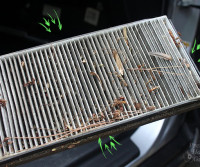
Your body filters itself in various ways: your kidneys, bladder, pancreas, and more. And just as your car’s engine is its heart, it usually gets the bulk of your attention.
But when those other organs act up, you start to notice. Previously unseen assistants start making themselves known in the worst way. Your cars filters can give you the same headaches, and it pays to replace them sooner rather than later! Here are the major filters on most cars, what they do, and how often they should be replaced.
Air Filter
Your air filter is your car’s mouth. As your engine breathes air to push through, the filter gets rid of pine needles, dead bugs, dust, and other fun stuff that could hamper that process. If it’s clogged, your engine will feel sluggish or even have trouble starting.
Air filter replacement guidelines vary, but a general rule is every 25,000 – 35,000 miles.
Oil Filter
Oil lubricates all the moving parts of your engine. Since your engine spends most of its time moving, oil gets a lot of use. It also picks up certain byproducts of your engine: dirt, grime, even microscopic metal shavings. The filter keeps those nasties in their own little prison.
Your oil filter should be changed every time you change your oil. No exceptions.
Fuel Filter
Gasoline can be surprisingly nasty, even after being refined. Factor in one too many poorly-cleaned gas pumps, age, and an emergency fill from the gas can in the shed, and things can get even nastier.
Manufacturers put the fuel filter in all kinds of places. Most are on the line from your gas tank (in the back) to your engine (usually in the front.) These can and should be replaced a few times in your car’s life, especially on older vehicles. Some cars have the filter directly in the tank, and it may never need replacement.
Cabin Air Filter
Many cars actually don’t filter their most important air: what passengers breathe! However, cabin air filters for your AC/heat vents are becoming increasingly common. That air comes from the outside. All those construction zones, gravel roads, and rainstorms you drive through? Your cabin air filter protects you from them. Replace it around once per year.
Transmission Filter
Your car’s transmission connects your engine to your tires. It works hard, and the gears inside gradually wear down. Their very tiny metal shavings can gum up the works. Transmission fluid catches those and redirect them to your transmission filter.
Transmission filters vary widely between types of transmissions. Many stickshifts don’t need one. Conventional automatic transmissions almost always have one, and it should be changed every 30,000 – 40,000 miles with the fluid.
Some new cars, especially high-end ones, have fancy automated manual or dual-clutch transmissions. The filters in these are much more sensitive, and usually need changing every 40,000 – 60,000 miles.
Always consult your owner’s manual for proper filter change intervals. And next time you stop by Fast Lube Plus, have us check your filters! Your car will thank you for it.
